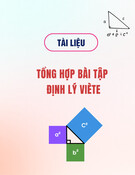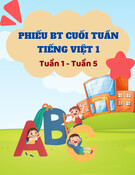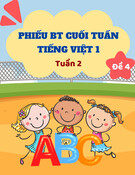
UBND QUẬN HÀ ĐÔNG
TRƯỜNG THCS DƯƠNG NỘI
ĐỀ CƯƠNG ÔN TẬP GIỮA KÌ I
MÔN TIẾNG ANH LỚP 8
Năm học 2023 – 2024
A. VOCABULARY
WORD PRONUNCIATION MEANING
balance (n) /ˈbæləns/ sự thăng bằng, sự cân bằng
bracelet (n) /ˈbreɪslət/ vòng đeo tay
crazy (adj) /ˈkreɪzi/ rất thích, quá say mê
cruel (adj) /ˈkruːəl/ độc ác
detest (v) /dɪˈtest/ căm ghét
DIY (do-it-yourself) (n) /ˌdiː aɪ ˈwaɪ/ hoạt động tự làm ra, sửa chữa hoặc
fancy (v) /ˈfænsi/ mến, thích
fold (v) /fəʊld/ gấp, gập
fond (adj) /fɒnd/ mến, thích
keen (adj) /kiːn/ say mê, ham thích
keep in touch /kiːp ɪn tʌtʃ/ giữ liên lạc (với ai)
kit (n) /kɪt/ bộ đồ nghề
leisure (n) /ˈleʒə/ thời gian rảnh rỗi
message (v) /ˈmesɪdʒ/ gửi tin nhắn
muscle (n) /ˈmʌsl/ cơ bắp
origami (n) /ˌɒrɪˈɡɑːmi/ nghệ thuật gấp giấy Nhật Bản
outdoors (adv) /ˌaʊtˈdɔːz/ ngoài trời
prefer (v) /prɪˈfɜː/ thích hơn
puzzle (n) /ˈpʌzl/ trò chơi câu đố / giải đố
resort (n) /rɪˈzɔːt/ khu nghỉ dưỡng
snowboarding (n) /ˈsnəʊbɔːdɪŋ/ trượt tuyết bằng ván
catch (v) /kætʃ/ đánh được, câu được (cá)
cattle (n) /ˈkætl/ gia súc
combine harvester /ˈkɒmbaɪn ˈhɑːvɪstə/ máy gặt đập liên hợp
crop (n) /krɒp/ vụ, mùa
cultivate (v) /ˈkʌltɪveɪt/ trồng trọt
dry (v) /draɪ/ phơi khô, sấy khô
feed (v) /fːd/ cho ăn
ferry (n) /ˈferi/ phà
harvest (n, v) /ˈhɑːvɪst/ vụ thu hoạch, vụ gặt, gặt hái, thu hoạch
herd (v) /hɜːd/ chăn giữ vật nuôi
hospitable (adj) /ˈhɒspɪtəbl/, mến khách, hiếu khách
lighthouse (n) /ˈlaɪthaʊs/ đèn biển, hải đăng
load (v) /ləʊd/ chất, chở
milk (v) /mɪlk/ vắt sữa
orchard (n) /ˈɔːtʃəd/ vườn cây ăn quả
1

paddy field (n) /ˈpædi ˌfːld/ ruộng lúa
picturesque (adj) /ˌpɪktʃəˈresk/ đẹp, hấp dẫn (phong cảnh)
plough (v) /plaʊ/ cày (thửa ruộng)
speciality (n) /ˌspeʃiˈæləti/ đặc sản
stretch (v) /stretʃ/ kéo dài ra
vast (adj) /vɑːst/ rộng lớn, mênh mông, bao la
well-trained (adj) /ˌwel ˈtreɪnd/ lành nghề, có tay nghề
account (n) /əˈkaʊnt/ tài khoản
browse (v) /braʊz/ đọc lướt, tìm (trên mạng)
bully (v) /ˈbʊli/ bắt nạt
bullying (n) /ˈbʊliɪŋ/ sự bắt nạt
concentrate (v) /ˈkɒnsntreɪt/ tập trung (vào)
connect (v) /kəˈnekt/ kết nối
craft (n) /krɑːft/ (nghề, đồ, kĩ nghệ) thủ công
enjoyable (adj) /ɪnˈdʒɔɪəbl/ thú vị, gây hứng thú
expectation (n) /ˌekspekˈteɪʃn/ sự mong chờ, kì vọng
focused (adj) /ˈfəʊkəst/ chuyên tâm, tập trung
forum (n) /ˈfɔːrəm/ diễn đàn
log (on to) (v) /lɒɡ (ən tə)/ đăng nhập
mature (adj) /məˈtʃʊə/ chín chắn, trưởng thành
media (n) /ˈmiːdiə/ (phương tiện) truyền thông
midterm (adj) /ˌmɪdˈtɜːm/ giữa kì
notification (n) /ˌnəʊtɪfɪˈkeɪʃn/ sự thông báo
B. GRAMMAR
I. VERBS OF LIKING AND DISLIKING
1. VERBS OF LIKING:
Động từ Nghĩa
Adore Yêu thích, mê mẩn
Love Yêu
Like/ enjoy/ fancy Thích
Don’t mind Không phiền
Dislike/ don’t like Không thích
Hate Ghét
Detest Căm ghét
2.VERBS OF LIKING + V_ING / TO V:
-Khi muốn dùng một động từ chỉ một hàng động khác ở sau động từ chỉ sự thích, ta phải sử dụng
danh động từ (V_ing) hoặc động từ nguyên thể co “to” (toV)
1.Verbs + V-ing/ to V
Những động từ đi với cả danh động từ và động từ nguyên thể có “to” mà không đổi về nghĩa
2

Verbs Verbs + V-ing Verbs +to V
Like I like skateboarding in my free time I like to skateboard in my free time
Love She loves training her dog She loves to train her dog
Hate He hates eating out He hates to eat out
Prefer My mother prefers going jogging My mother prefers to go jogging
2. Verbs + V-ing
Những động từ chỉ đi với danh động từ
Verbs Verbs + V-ing
Adore They adore eating ice-cream
Enjoy We enjoy playing basketball
Fancy Do you fancy making crafts?
Don’t mind I don’t mind cooking
Dislike Does he dislike swimming?
Detest I detest doing housework
II. COMPARISONS.
1. So sánh hơn của trạng từ là gì?
So sánh hơn của trạng từ, giống trường hợp so sánh hơn của tính từ, mô tả sự khác biệt và tương
đồng giữa hai thứ. Trong khi tính từ ở thể so sánh mô tả giống – khác giữa 2 danh từ (người, địa
điểm, vật dụng), trạng từ ở thể so sánh mô tả giống – khác giữa 2 động từ - tức là mô tả cách thức,
thời điểm, tần suất hay mức độ một hành động được thực hiện.
Ví dụ:
“John is faster than Tim.” (comparative adjective - so sánh hơn của tính từ)
“John runs faster than Tim.” (comparative adverb - so sánh hơn của trạng từ)
“John is more careful than Tim in his work.” (comparative adjective - so sánh hơn của tính
từ)
“John works more carefully than Tim.” (comparative adverb - so sánh hơn của trạng từ)
2. Cách tạo thành trạng từ ở thể so sánh hơn
Chúng ta thường thêm đuôi er vào trạng từ gốc hoặc thêm more/less vào trước trạng từ gốc. Cụ
thể là:
2.1. Trạng từ 1 âm tiết
Ta thêm er vào cuối trạng từ. Khi trạng từ kết thúc bằng “e” thì chỉ cần thêm “r” để chuyển sang
thể so sánh hơn.
Ví dụ:
Trạng từ (dạng gốc) Trạng từ ở thể so sánh hơn
fast faster
hard harder
high higher
late later
long longer
low lower
wide wider
3

2.2. More + trạng từ đuôi “ly”
Với trạng từ đuôi "ly", ta thêm more vào trước trạng từ khi thực hiện so sánh hơn. Khi so sánh
kém, ta thay more bằng less.
Ví dụ:
Tính từ Trạng từ Trạng từ ở thể so sánh hơn
careful carefully more/less carefully
efficient efficiently more/less efficiently
happy happily more/less happily
horrible horribly more/less horribly
recent recently more/less recently
sad sadly more/less sadly
strange strangely more/less strangely
3. Một số trường hợp bất quy tắc
Trạng từ Trạng từ ở thể so sánh hơn
badly worse
early earlier
far farther/further*
little less
well better
4. Một số lưu ý
4.1. Trường hợp Further và Farther:
Mặc dù farther và further thường được dùng thay cho nhau, vẫn có sự khác biệt giữa hai dạng này.
Trong tiếng Anh - Mỹ, farther được dùng nhiều hơn khi so sánh về khoảng cách vật lý; further để
so sánh khoảng cách mang nghĩa hình tượng. Còn trong tiếng Anh – Anh, further được lựa chọn
dùng nhiều hơn với cả 2 trường hợp.
4.2. So sánh hơn của trạng từ có 2 dạng: chính thống và trong ngôn ngữ đời thường
Có một số trạng từ có cả 2 dạng: chính thống (“đúng”) - có đuôi “ly” và không chính thống (ngôn
ngữ đời thường) - không có đuôi “ly”. Tương tự với dạng so sánh hơn của nhóm trạng từ này. Dù
những chuyên gia ngữ pháp tiếng Anh truyền thống thường coi những động từ không có đuôi “ly”
là không đúng, chúng vẫn được sử dụng trong tiếng Anh hiện đại. Nhưng tất nhiên, tính chính
thống của chúng kém hơn so với các trạng từ đuôi “ly”.
Lưu ý: Bạn có thể nghe một số người bản địa dùng dạng không chính thống của trạng từ khi nói.
Tuy nhiên, tốt nhất tránh làm vậy trong những tình huống chính thống và các bài kiểm tra.
Trạng từ Trạng từ ở thể so sánh hơn
cheap/cheaply cheaper/more cheaply
loud/loudly louder/more loudly
quick/quickly quicker/more quickly
slow/slowly slower/more slowl
4.3. Ta có thể dùng less thay cho more để hàm ý sự giảm đi của hành động.
Ví dụ Giải nghĩa
4

She visits often. 1 lần/tuần
Now she visits more often. ↑ 1 lần/ngày
Now she visits less often. ↓ 1 lần/tháng
4.4. Có thể loại bỏ một trong hai danh từ.
Thông thường, ta không cần đề cập tới cả 2 người/vật được so sánh. Bởi điều này đã thể hiện rõ
ràng trong ngữ cảnh. Nếu người nói đã biết ai/cái gì đang nói tới, ta có thể lược bỏ bớt một danh
từ. Khi đó, không cần dùng than nữa.
Ví dụ: Speaker A: “Who swims faster, you or your brother?”
Speaker B: “My brother does, but I can run faster.”
4.5. Ta chỉ có thể thực hiện phép so sánh với các trạng từ có thể phân cấp được
Đó là những trạng từ thể hiện sự hơn kém nhau về mức độ. Ví dụ: quickly là trạng từ có thể phân
cấp được bởi một người có thể chạy nhanh (run quickly), chạy rất nhanh (very quickly) hoặc cực
kỳ nhanh (extremely quickly).
Như vậy, có thể dùng các từ, cụm từ nhấn mạnh như a bit, a little (bit), much, a lot, far để nhấn
mạnh sự khác biệt.
much far a lot quite a lot
a great deal a good deal a good bit a fair bit
a bit slightly rather a little
a little bit just a little bit
III. SIMPLE SENTENCES AND COMPOUND SENTENCES
(Câu đơn và câu ghép)
1. Simple Sentences (Câu đơn)
- Chỉ có 1 mệnh đề chính, nghĩa là có 1 chủ ngữ và 1 động từ: S + V
- Có thể chủ ngữ là 2 danh từ nối với nhau bằng 'and' hoặc có 2 động từ nối với nhau bằng 'and'
nhưng vẫn là 1 câu đơn.
E.g: Iwent to the supermarket yesterday. (Tớ đi siêu thị ngày hôm qua.)
S V
Mary and Tomare playing tennis. (Mary và Tom đang chơi tennis.)
S V
My brotherate a sandwich and drank beer.
S V (Anh trai của tôi đã ăn bánh sandwich và uống bia.)
2. Compound Sentences (Câu ghép)
- Một câu ghép gồm 2 hoặc 3 mênh đe doc ịÔỊ) (mdependent, clause), hay còn gọi là những câu
đơn được nối với nhau bởi liên từ kết hợp (coordinating conjunction) hoặc trạng từ liên kết
(conjunctive adverbs).
a. Coordinating conjunction (Liên từ kết họp)
- Chúng ta có các liên từ kết hợp thông dụng sau:
F = for A = and N = nor B = but O = or Y = yet S
= so
Từ “FANBOYS” là một cách viết để nhớ các "conjunctions" phổ biến nhất một cách dễ dàng, đây
là các liên từ khác nhau để tạo nên câu ghép.
Liên Ý nghĩa Ví dụ
5




![Bài tập so sánh hơn và so sánh nhất của tính từ [kèm đáp án/mới nhất]](https://cdn.tailieu.vn/images/document/thumbnail/2025/20250808/nhatlinhluong27@gmail.com/135x160/77671754900604.jpg)
![Tài liệu tham khảo Tiếng Anh lớp 8 [mới nhất/hay nhất/chuẩn nhất]](https://cdn.tailieu.vn/images/document/thumbnail/2025/20250806/anhvan.knndl.htc@gmail.com/135x160/54311754535084.jpg)




![Tài liệu Lý thuyết và Bài tập Tiếng Anh lớp 6 [Mới nhất]](https://cdn.tailieu.vn/images/document/thumbnail/2025/20250802/hoihoangdang@gmail.com/135x160/18041754292798.jpg)





